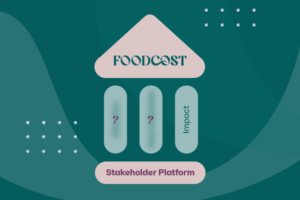The FOODCoST Impact Pillar
17 Jan. 2024
The IMPACT section of the FOODCoST project focuses on assessing the welfare and sustainability impacts of combining effective policy measures and business strategies for the internalization of food system externalities. FOODCoST employs a participatory approach, viewing all stakeholders as key actors. The emphasis lies on fostering collaboration and sustainability throughout the entire food system.

Leveraging insights from FOODCoST case studies and stakeholders’ collaboration, the three scenarios will focus on combining policy instruments and business strategies for internalising externalities. Grounded in a foresight methodology, these scenarios incorporate inputs from European and national levels, benefiting from project findings and engaging stakeholders through focus groups. A dedicated Integrated FOODCoST Toolbox for impact analysis will also be developed. The FOODCoST Integrated toolbox evaluates the welfare and sustainability impacts of these scenarios in alignment with the Sustainable Development Goals (SDGs).
Using a tailored methodological protocol, activities scrutinise scenario adoption within case studies, employing Key Performance Indicators (KPIs) for continuous, participatory monitoring. The comprehensive FOODCoST Roadmap, informed by prior insights, outlines optimal instances for research, innovation and specific policy measures and business strategies. This section of the project aims to create a comprehensive roadmap based on impact assessments and results, guiding policy stakeholders and business managers on the optimal application of specific policy recommendations and business strategies for promoting sustainable food systems.
The way impact is measured in the FOODCoST project is key for the production of results which connect sustainability impacts with an integrated welfare-based approach. Following the food system ambition of meeting the many dimensions and trade-offs of SDGs, assessing the impact of internalising externalities of food production and consumption is crucial and will represent a value starting point for future research and debates on the re-definition of the value of food.
Partners involved
The work within the Impact Pillar is conducted by UNIBO (University of Bologna, Italy) and supported by UOX (University of Oxford, United Kingdom), WR (Stichting Wageningen Research, The Netherlands), SLU (Svegires lantbruksuniversitet, Sweden), UCLouvain (Université Catholique de Louvain, Belgium), INRAE (Institut National de recherce pour l’agriculture, l’alimentation et l’environment, France), AKI (AKI Agrarkozgazdasagi Intezet Nonprofit Forlatolt Felelossegu Tarsasag, Hungary), EUR (European Centre of Agricultural, Regional and Environmental Policy Research, Germany), UASMV (Univeritatea de Stiinte Agricole si Medicina Veterinaria Cluj-Napoca, Romania), UAL (University of Almeria, Spain), RIVM (Rijksinstituut voor Volksgezondheid en Milieu, The Netherlands), and SUS (Sustainable AG, Germany).
